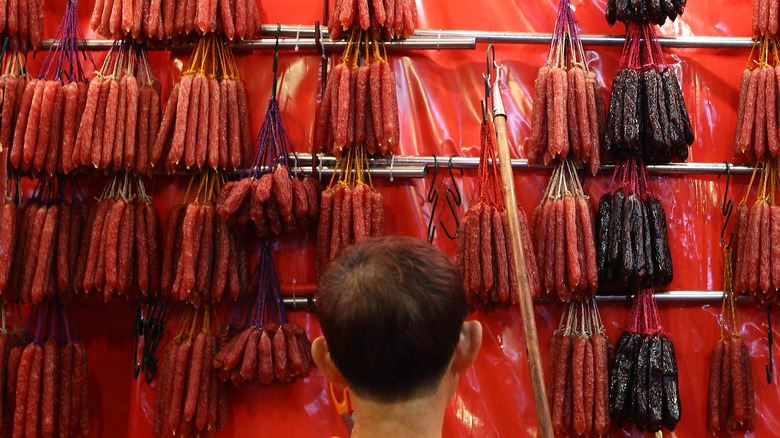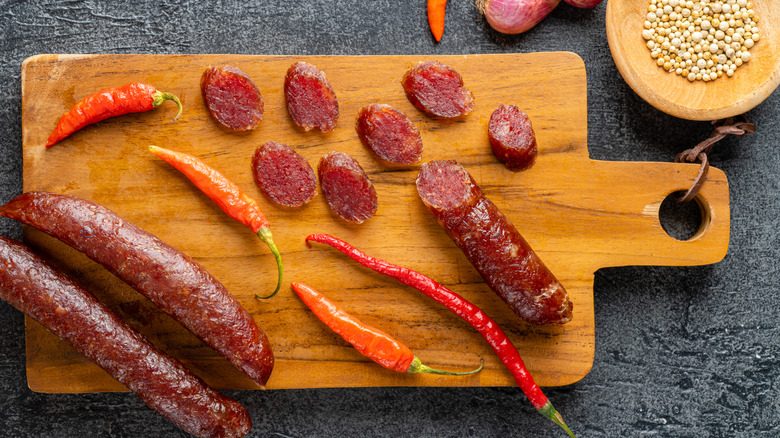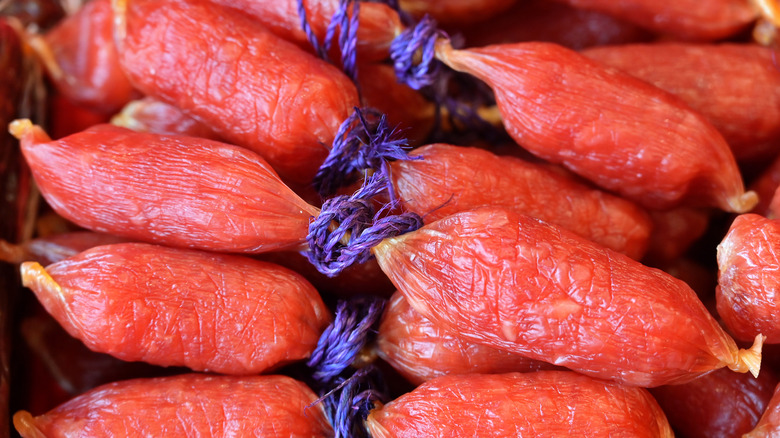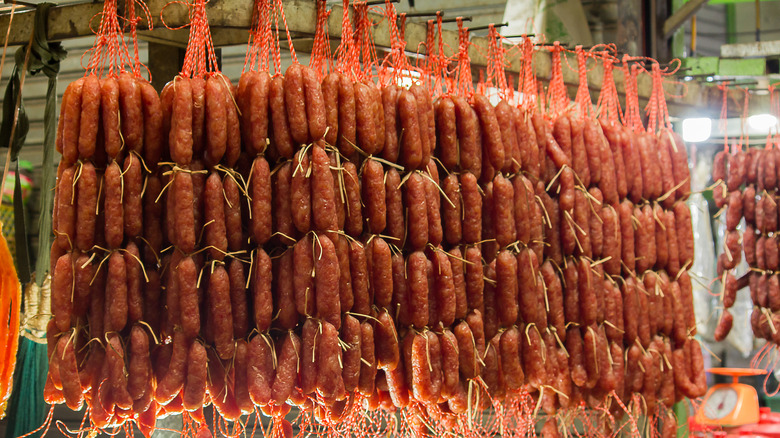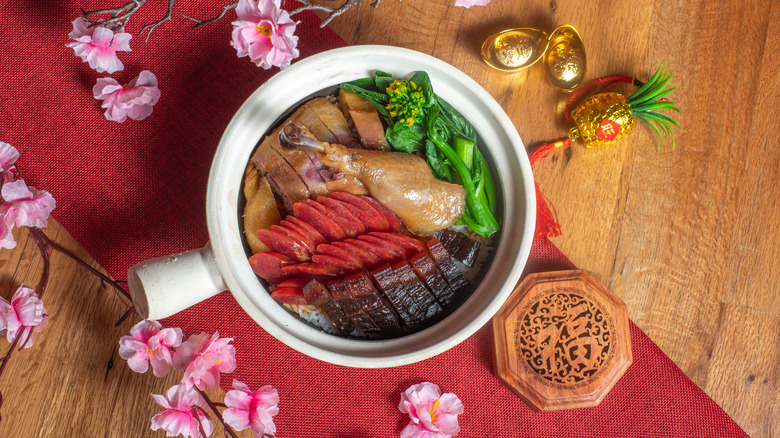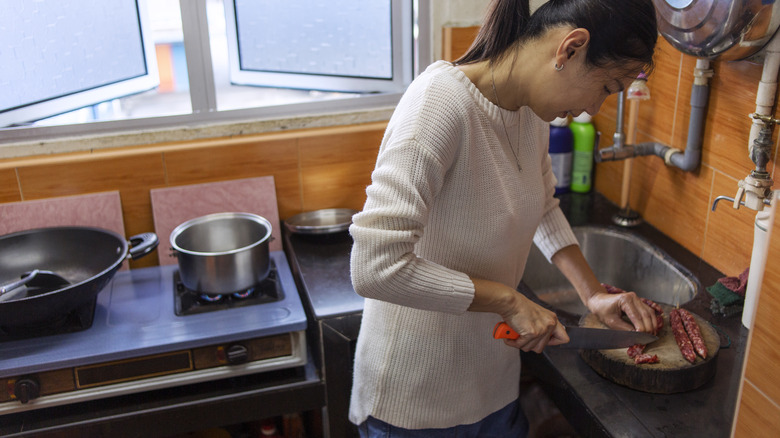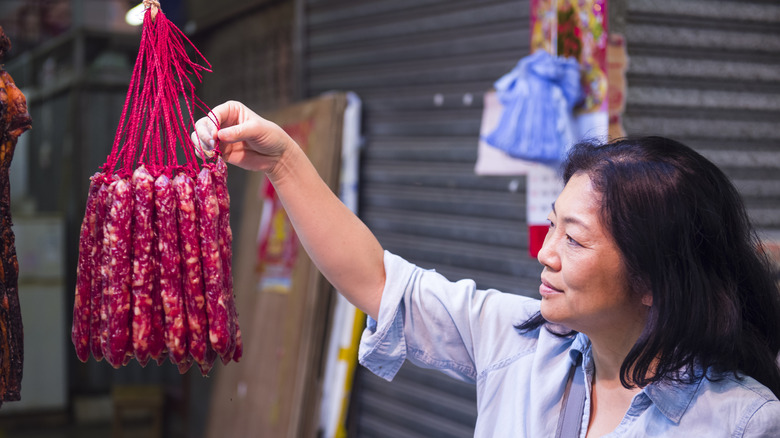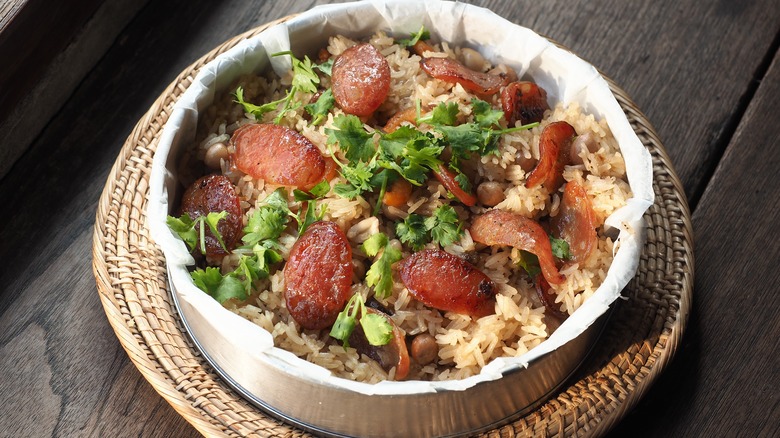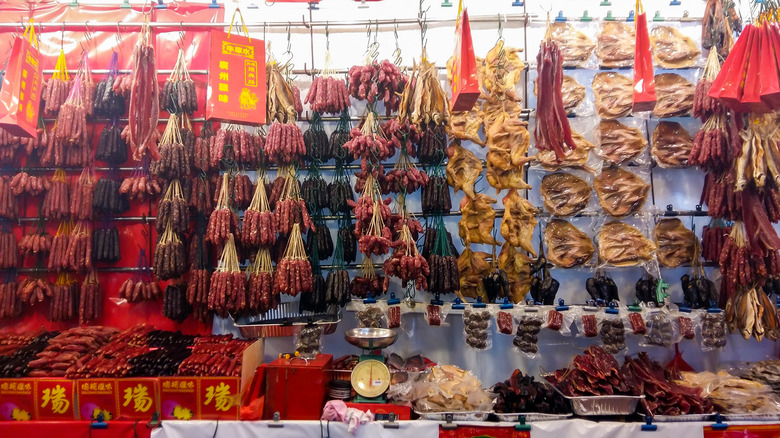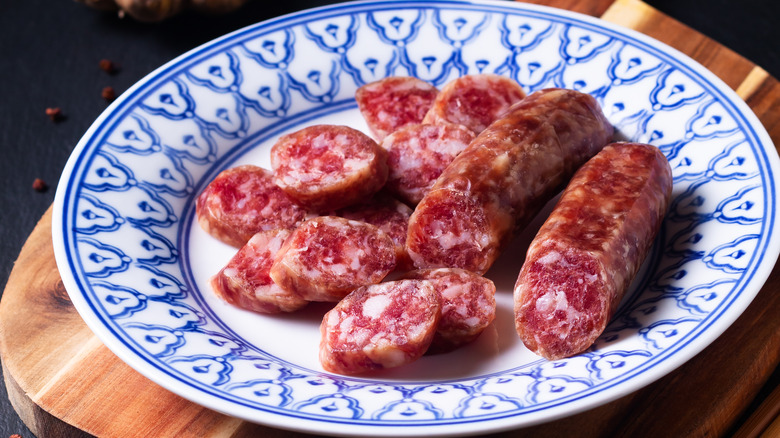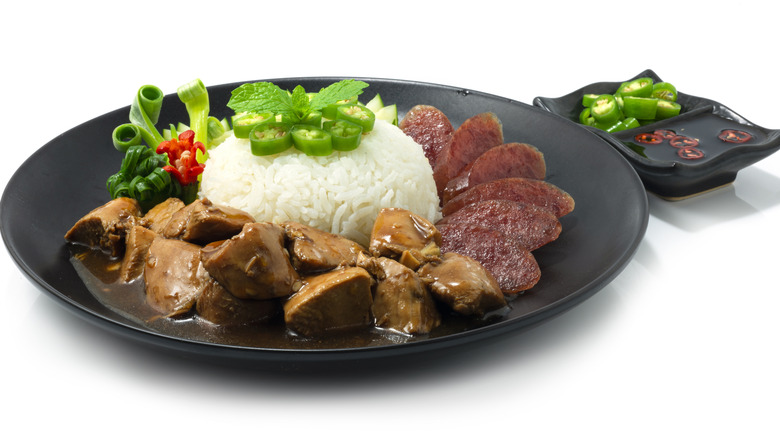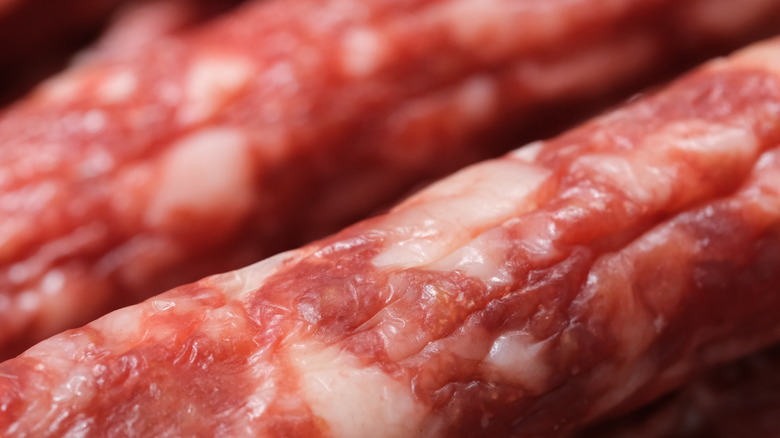What Is Lap Cheong And How Do You Cook With It?
Regular visitors to traditional Cantonese restaurants will instantly recognize the look and taste of lap cheong, even if they're unfamiliar with the name. The deep red, dense, salty-sweet dried sausage is a unique and distinctive element of Chinese cooking. It's a staple in kitchens throughout the Chinese diaspora, and home cooks know a few slices of it are all it takes to make a plain pot of rice or vegetable stir-fry into a satisfying meal.
While it's now available and served year-round, it historically evolved as a winter dish. By December, the last year's pigs had already grown good and fat, and feeding them enough to keep them that way throughout the cold winter months would be both expensive and labor-intensive. Instead, farmers slaughtered the pigs, preserved them as sausages, and enjoyed their salty-sweet richness throughout the winter. While the hearty flavor of lap cheong is a welcome addition to cold-weather meals, you can also enjoy it, as most people now do, year-round.
What is lap cheong?
Lap cheong is a dried Chinese sausage. Its name translates as "winter stuffed sausage/intestine" ("cheong" can mean both sausage and intestine). The sausages come in slender links and because they're air-dried, they're hard and dense — more like a pepperoni stick or Slim Jim in texture than a hot dog or breakfast sausage. Unlike pepperoni sticks, however, they are sold raw, so they need to be cooked before serving. (Standardly, they're chopped or sliced before being steamed, stewed, or sauteed with other foods.)
Unlike many sausages, lap cheong has no starchy fillers — they're nothing but chopped meat, fat, and flavorings. And, depending on the variety of lap cheong, their ingredients and color can vary –- sausages can range from bright red to dark brownish red. Connoisseurs take the exact composition of lap cheong seriously, debating the textural merits of sausages with fresh or aged casings. Since lap cheong can be found in any Asian grocery store, it won't be hard for you to try some and choose your favorite.
How is lap cheong made?
Lap cheong ingredients vary across regions, but the most commonly encountered version in the U.S. is the Hong Kong–style, all-pork sausage. It contains a mixture of coarsely ground lean pork and pork fat, salt, sugar, and flavorings. The most distinctive (and romantic-sounding) of these is Chinese rose wine; other flavorings can include powdered ginger and black or white pepper. The red color of the finished sausages traditionally comes from the addition of red yeast rice powder.
The meat and fat are first mixed with the seasonings and allowed to sit overnight to cure. After the filling is stuffed into cleaned sheep intestine casings and the links are tied, the casings are pierced with a clean needle to help the sausages dry. The sausages are then left to dry (in a refrigerator or other clean open space) for 10–15 days, or until they've lost about a third of their original weight. At this point, they're ready to cook and eat.
Lap cheong vs. other dried sausage types
Even if you consider yourself an expert on Western-style sausages, lap cheong may come as a surprise to you if you've never tasted it. It looks pretty much like any other rustic dried sausage – it comes in hot-dog-length skinny links that appear a bit wrinkled on the outside with a shiny casing – and it looks pretty much like a typical dry sausage on the inside, too: dark red or pink with conspicuous flecks of white fat.
But, it differs from other sausages in several ways. First, while the filling for pepperoni is emulsified, the filling for lap cheong is not — the meat and fat are simply blended with the seasonings. While Western-style dry sausages such as salami and dry chorizo are ready to eat when purchased, lap cheong needs to be cooked before serving. Finally, its seasonings are radically different. Instead of the generous dose of salt, garlic, and spices you'll encounter in more familiar dried sausage, lap cheong is distinctly sweet with a touch of saltiness.
What does lap cheong taste like?
Trying to describe what lap cheong tastes like is a bit like trying to describe the taste of Coca-Cola: It's sweet, maybe a little bit spicy, but beyond that, it just ... is. Looking at the list of ingredients won't help you figure it out – lap cheong may contain flavorings such as rose wine and ginger, but it's hard to pick out these flavors in a bite of lap cheong (not that many would know what rose wine is supposed to taste like in any case).
Once you taste lap cheong, you'll know you've got something distinctly different from better-known dried sausages, such as pepperoni, dry chorizo, or dry salami. Instead of a burst of garlic and spice, you'll get a hit of sweetness and a bit of saltiness. Often, the texture will be a bit coarser than that of other dried sausages, too — you'll be able to see distinct little chunks of meat in each bite. While it's not as aggressively spiced as other dried sausages, it's far from dull. Despite its fairly short ingredient list, the whole is more than the sum of its parts, and its taste is far more complex than a simple combination of salt, sugar, and pork.
How to cook with lap cheong
A reason lap cheong is a favorite among Chinese cooks is because it's so easy to work with. While it's a raw cured sausage that needs to be cooked before eating, cooking it takes very little effort. Penny-pinching students and busy moms alike know that you can just pop a link or two (whole or sliced) on top of a pot of rice before cooking to make a satisfying light meal or side dish — the fat from the sausage permeates the rice, giving it extra richness and meaty flavor.
Another easy way to use it is to slice it and add it to a basic vegetable stir-fry — it's a great match for sturdy Asian greens such as choy sum. It's also frequently used in braised or steamed dishes, as well as in fried rice and noodle dishes. Lap cehong is also traditionally enjoyed at Lunar New Year celebrations, and it also makes a great filling for steamed or baked buns –- comparable to a pepperoni roll.
Where to buy lap cheong
If you live in a community with a Chinatown or even just a modest Asian grocery shop, you'll have no trouble finding lap cheong. In artisanal meat markets, you can find strings of the sausages hanging in the open air, awaiting buyers. When choosing among these, look for sausages that are richly colored with a pleasant aroma. Avoid any that smell sour (or that smell like nothing at all). More commonly, however, you'll find sealed plastic packages of lap cheong, typically containing about eight sausages each. While the sealed packages don't need to be refrigerated, they can often be found in refrigerated cases near the other meat products.
Even if you don't have an Asian grocery nearby, you can still obtain lap cheong easily online. Specialty purveyors of Asian food offer numerous varieties, but you can even order it through mainstream retailers and supermarkets, including Amazon, Costco, and Walmart.
Nutritional information about lap cheong
Lap cheong is a soul-warming comfort food in the minds of many lovers of Chinese cooking. But, like most sausages, it's not exactly diet food. A cup of lap cheong has 458 calories, 113 milligrams of cholesterol, and 1011 milligrams of sodium. For context, UCSF Health recommends that you consume no more than 200 milligrams of cholesterol a day if you're at risk for heart disease, and no more than 300 milligrams a day if you have no risk factors. In addition, the FDA recommends that adults restrict their sodium intake to 2300 milligrams a day or less.
This means that a cup of lap cheong comprises at least a third of your suggested intake of cholesterol and close to half your daily amount of sodium. In practice, it's not that common to eat a whole link of lap cheong in a single sitting –- it's so intensely flavored that a cup of lap cheong pieces is much more likely to be used as an accent in a dish feeding several people, such as a platter of stir-fried vegetables or noodles. So, as in all aspects of Chinese cooking, balance is key — when enjoyed in moderation, lap cheong won't put you in the cardiac ward.
Varieties of lap cheong
China is a huge country, home to dozens of language groups and regional cuisines shaped by the local climate, ecosystem, and culture. As a result, even basic dishes and preparations — such as lap cheong — can vary widely from region to region, and even families in the same area may have their own favorite recipes.
The most commonly encountered version found in the U.S. is a deep pink or reddish all-pork sausage with a sweet-salty flavor. But, other varieties can be found, including versions made with duck liver or with a combination of duck liver and fatty pork. If you shop at a specialty Chinese cured meat shop, you can find varieties in different shapes and sizes – some may even be smoked. The Sichuan region, known for its fiery foods, has its own spicy version of lap cheong. And, modern Hong Kong cooks continue to experiment with lap cheong, making varieties that incorporate ingredients such as dried oysters.
How to store lap cheong
Lap cheong was originally developed as a means of preserving meat for extended periods in the pre-refrigeration era, so it's easy to keep around by design. Its staying power is one of the reasons that it's so popular with home cooks – it maintains its quality well when properly stored, meaning that cooks can count on it being there when they need to get dinner on the table quickly.
When you buy lap cheong, you're most likely to find it in plastic-wrapped, vacuum-sealed packets. If you don't plan on using it right away, you can just keep the sealed packet in your pantry –- it doesn't need to be refrigerated. Once you open the packet, however, it's best to store any leftovers sealed in the refrigerator, where they will stay fresh for several weeks. (For longer storage, put them in the freezer.) To enjoy lap cheong at its best, be mindful of the expiration date on the package and discard any sausages that start to show any mold.
Lap cheong has a thousand-year-old history
Throughout the Chinese diaspora, lap cheong is seen as a nostalgia food –- something everyone remembers eating as a kid, and something that evokes home and family no matter where one finds oneself in the world. A big reason for this is that lap cheong has been deeply embedded in Chinese culinary history for a long time –- literally over a thousand years.
The first written record in Chinese of sausage production as we know it –- that is, meat stuffed into casings –- dates to 455 AD. The description appeared in a guide titled "Essential Techniques for the Welfare of the People," suggesting that even then, sausages were considered an essential part of a good life. Lap cheong evolved into different forms over the years, but the Hong Kong–style variety that's most commonly found in the U.S. is said to have been invented by a restaurant owner in 1894.
Feeling ambitious? Make your own lap cheong
While most cooks consider lap cheong, like soy sauce and other Chinese pantry staples, a store-bought item, some more traditional (and ambitious) families still make their own, especially for Lunar New Year celebrations. It's doable, provided you have adequate time and refrigerator space, but it requires care and close attention to cleanliness.
To make it, use fresh (not previously frozen) pork and pork fat. Grind them together coarsely and mix with salt, sugar, and seasonings –- use a sterile spoon or paddle or clean, food-safe disposable gloves to do this, not your bare hands. Let the meat rest covered in the refrigerator overnight to absorb the seasonings and develop its flavor. Meanwhile, thoroughly wash, rinse, and blot dry your sheep intestine casings, then soak both the casings and a thick, clean needle in rose wine to sterilize them. Stuff the casings with the filling, dividing the sausage into six-inch links. Pierce the links the sterilized needle to prevent air bubbles from forming and to facilitate drying. Weigh the sausages, then brush their casings with more rose wine. Set the links on a wire rack and allow them to dry in the refrigerator until they've lost about a third of their weight. This should take between 10 and 15 days.

